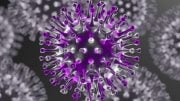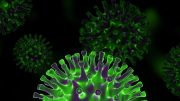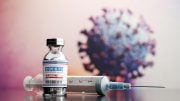
A SARS-CoV-2 variant with traits similar to that of the Delta variant—enhanced transmissibility and an ability to infect people who had previous infections/vaccination—will cause a more severe pandemic with more infections and breakthrough infections/reinfections than variants with either trait alone, according to a mathematical model created by researchers at Harvard T.H. Chan School of Public Health.
Their work, which was published online November 19, 2021, in the journal Cell, could help researchers and public health officials interpret the significance of novel and existing variants and design tailored public health responses for various scenarios based on a variant’s characteristics.
“Thus far, evidence of immune escape—the ability of a variant to evade the immune system and cause reinfections or breakthrough infections—has been a red flag,” said Mary Bushman, co-author of the Cell paper and a postdoctoral research fellow in the Department of Epidemiology at Harvard Chan School. “Our findings say it’s maybe more of a yellow flag—this is not such a big deal on its own. But when it’s combined with enhanced transmissibility, then it can be a really big deal.”
As the COVID pandemic has progressed, variants of the initial wild-type SARS-CoV-2 virus have emerged. Some have quickly become a dominant strain and increased the number of infections, like the Alpha and Delta variants, while others, like Beta, failed to take hold or significantly affect the pandemic’s trajectory. To understand the effects that certain factors would have on a pandemic, Bushman created a model that simulates how pandemics fueled by hypothetical variants would affect populations that are using various combinations of masking with physical distancing, and vaccinations.
The analysis simulated a SARS-CoV-2 pandemic with several different hypothetical variants including combinations of the two traits: enhanced transmissibility, similar to the Alpha variant; partial immune escape, similar to the Beta variant; enhanced transmissibility with partial immune escape, similar to the Delta variant; and a variant with neither trait. The analysis also factored in how certain variables, such as masking/physical distancing or vaccinations, would affect the pandemic’s trajectory. For each of the scenarios, the researchers analyzed the total number of infections as well as the number/percentage of infections averted by vaccination.
Bushman and their team determined that a variant with enhanced transmissibility alone would likely be more dangerous than a variant that could partially evade the immune system. Yet a variant with both traits could cause more infections, reinfections, and breakthrough infections than a variant with either trait alone.
According to the model, vaccination is also predicted to be highly beneficial in the case of Delta-like variants because vaccinations would prevent a greater number of cases that a more transmissible virus would potentially cause, and because the milder nature of breakthrough infections should substantially reduce overall mortality.
“It’s really important that people realize the emergence of variants like Delta make high levels of vaccination all the more crucial,” said Bill Hanage, associate professor of epidemiology and co-author of the Cell paper. “Even if we cannot eliminate the virus, we can ensure that people face it with the best preparation, and a more transmissible virus means there will be more infections in the absence of vaccination, so more people stand to benefit from it.”
Other Harvard Chan School co-authors of the study included Rebecca Kahn, Bradford Taylor, and Marc Lipsitch.
This research was supported by the National Institute of Allergy and Infectious Diseases of the National Institutes of Health (R01AI128344), U.S. National Cancer Institute SeroNet (U01CA261277), and the U.S. Centers for Disease Control and Prevention (200-2016-91779).
Reference: “Population impact of SARS-CoV-2 variants with enhanced transmissibility and/or partial immune escape” by Mary Bushman, Rebecca Kahn, Bradford P. Taylor, Marc Lipsitch and William P. Hanage, 19 November 2021, Cell.
DOI: 10.1016/j.cell.2021.11.026








All the coronaviruses and all their variants have different protein spikes, with Delta having one that’s more efficient at getting around the vaccines. But the real problem is in the virus itself, not its protein shell, and why the most dangerous (MERS, SARS, and Covid-19) are so infectious. My independent research has found multiple one-in-a-million nucleotide sequence matches between all the coronaviruses and the human genome. Those sequences are the same as some of the loops of human tRNA. Using those loops and their amino acid code matches, viruses may be able to fool the nucleus membrane in cells to allow the virus to enter and associate with the human DNA, creating more opportunities for further infection. Our immune system may be compromised and may no longer be able to stop the virus and other diseases from attacking organs throughout the body. Vaccines that attack the virus protein shells while ignoring their contents are doomed to failure from the Darwin effect, but recognizing these loops suggests a possible approach to successful coronavirus vaccines. Only the infection process is considered in my work, not the innate virulence of the virus. For more info, check out this YouTube, Coronavirus – Using Your DNA Against You. https://www.youtube.com/watch?v=8dOIzD6ch8s
Ivermectin is NOT FDA approved. Dont publish something you know nothing about. Phizer has done a great job in a short period of time. it takes 7-10 years to find something that go;s through several big time trials. Phizer did it a little over 1 year, amazing job when u think of it.Hundreds of pill makers are begging the government to give theirs a try. They just want the dollars, their solutions DONT WORK,NOT FDA APPROVED, AND VERY LITTLE TRIALS. Stick with ones that are approved and do the job.